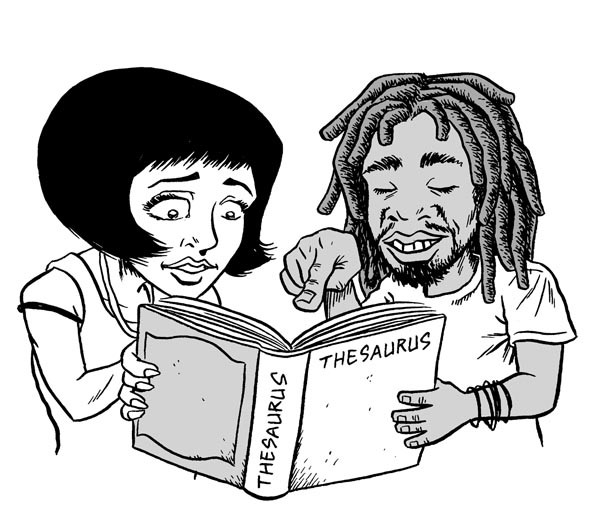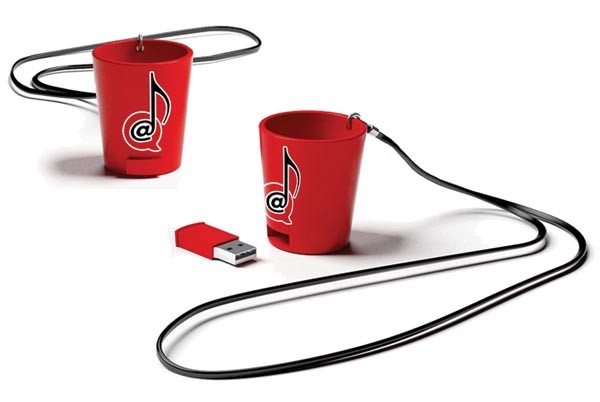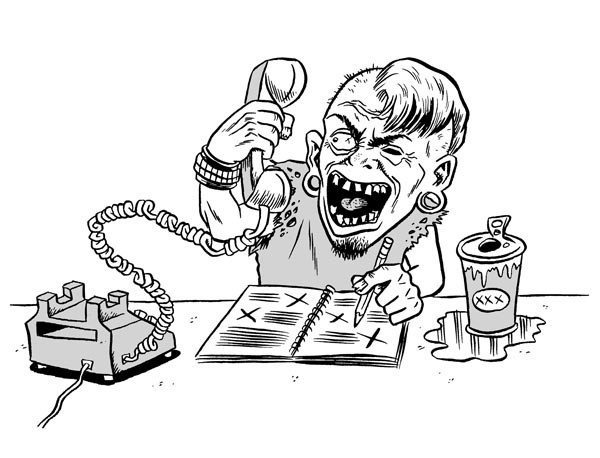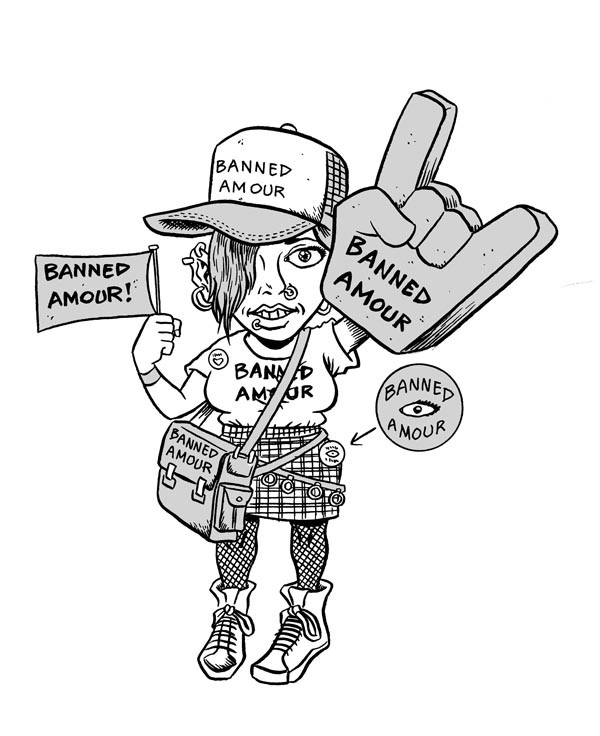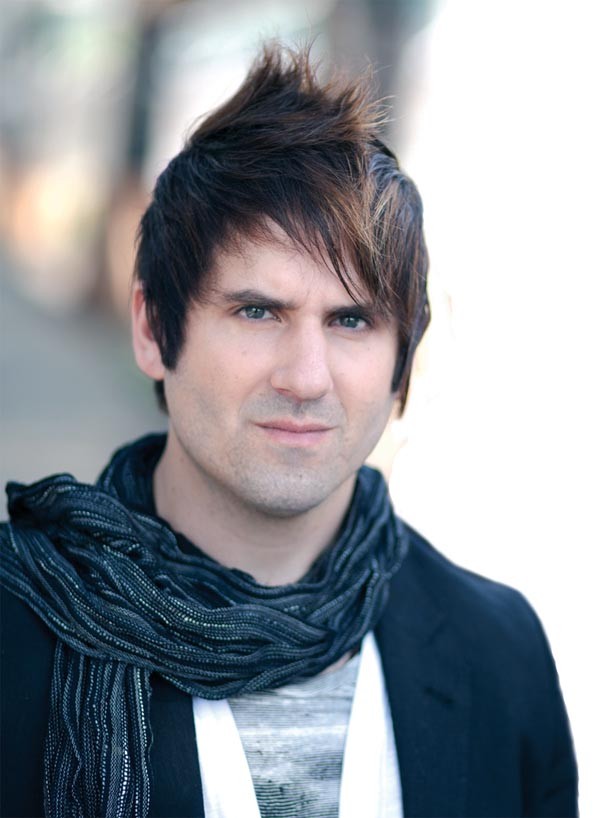Earlier this year, Time ran a piece in its Entrepreneurial Insights column by a pair of brothers in a Brooklyn-based band called Two Lights; in it, the two estimated that the grand total they (and their parents) had sunk into trying to make it as an indie band was about $100,000.
It was, of course, a little silly, and some of the costs were questionable. "Lost wages" based on the time spent working on music? Face it, Two Lights: If you weren't playing songs with those 20 hours, you'd probably be smoking pot and watching M*A*S*H reruns. And $500 a month for voice lessons for an "indie rock" band? This is the genre popularized by J. Mascis and Stephen Malkmus, guys!
But the overarching point, underneath the whiny itemizations, is that there's a lot to consider when you're starting a band. It's like a puppy, or a baby: It seems like cute fun at first, then quickly starts to grow into something less manageable.
You can, of course, quit your band a lot more easily than you can quit your puppy or your baby, but we don't want you to. That's why we put together this handy guide to starting a band. From finding bandmates to booking tour dates, we've got advice from some local pros (and advice we just made up).
If you're looking to start a band, please follow our advice to the letter; it'll make you famous. If you're not — give a look anyway. Perhaps you'll gain a greater appreciation for the music scene around you. Or at least you'll find new ways to come up with potential names for your fake band.
Finding Bandmates: Some Dos and Don'ts
Do start a band with people you meet at school or work. After interacting with them on a day-to-day basis, you should have a sense of whether they're reliable, and if you can get along with them.
Don't start a band with that guy you met at your pot dealer's house.
Do be open to different musical backgrounds. Not everyone in your band needs to have a music-school degree. In fact, you're probably better off if they don't.
Don't be offended if 80 percent of the people who express interest in jamming flake out on you.
If you need a drummer: Do look for the person using their index fingers to play drum solos on the bar.
Don't recruit the guy playing acoustic guitar on the lawn outside the freshman dorms. (We mean as a drummer, but on second thought: Do yourself a favor and don't recruit that dude for anything.)
Do post a call for band members on Craigslist.
Don't complain in said post about things not working out in the past, for the same reason you don't want to complain about that in an online dating profile: Most people will assume that you're the problem.
Do list some of your influences in the ad (e.g., "Like Modern Lovers, The Minutemen, Roky Erickson and the Aliens").
Don't list every band you've ever liked (e.g., "Mainly inspired by The Beatles, The Rolling Stones, The Zombies, Ani DiFranco, Mott the Hoople, early Black Sabbath, later Black Sabbath, some of Ozzy's early-'90s solo stuff, Depeche Mode, De La Soul, Can, P.M. Dawn, Maurice Ravel, Kanye, Corrosion of Conformity, This Bike Is a Pipe Bomb, Kate Bush, ELO, Jethro Tull, The Swamp Rats").
Picking a Band Name
Playing music is one thing — to be a band, though, you need a name. Here are a few format possibilities to get you started.
[Your Name] and the [Somethings] (e.g., Dr. Teeth and the Electric Mayhem)
This one is easy. All you have to do is decide on the Something ("Snails?" "Cloggers?"), and then fight over who gets top billing. Works best for classic-rock bands, country bands, funk bands, former solo projects. You can get creative, but be careful what you wish for: You know how angry Darius Rucker used to get when people called him "Hootie."
Literary Sentence Names (e.g., The Devil Wears Prada, As I Lay Dying )
"Chick lit" and classic literature genres are both rife with plunderable titles. Wolf in Chic Clothing and Catcher in the Rye are both available. Best suited to emo, metalcore and/or pop-punk bands.
Apocalyptic Names (e.g., Slayer, Destroyer, Apocalypse)
Try picking out words at random from the Book of Revelation. Best suited to thrash or death-metal bands, but indie rockers can make it work. Careful what you choose; this could also make you out to be a Christian metal band. Potential names: The Golden Censer, Seven-Headed Dragon, Throne of the Beast.
Plural Names (e.g., Cults, Swans, Death Grips)
Pick a word you like, add an "s" at the end. Actually not as easy as it sounds.
If you're really stuck, sites like www.bandmaker.com or the anagram generator at www.wordsmith.org do the work for you, as long as you don't mind people assuming your band was formed in 1997.
From Bandmaker: Giant Stroke, Bird of the Silenced Pyramid, Porcine Crush, Slim Ritual, Living Blasphemy
Choice anagrams for "Our Band Name": Boa Armed Nun, A Bad Omen Urn, Banned Amour (Hey, that one's actually pretty good!)
Get Onstage
You've found the bandmates. You've picked the name. You've written a few songs and maybe learned to cover "Love Is a Wonderful Thing." Now you need to find an audience — and you can't get an audience without first getting someone to let you onto their stage.
Brendan Pester works for Opus One Productions and books local talent for Mr. Small's Theater; he offers some advice for hopeful musicians.
"Honestly, one of the biggest things [leading to local bookings] is how professional and broad the band's web presence is," Pester says. "We don't accept physical press kits. We're going to look at a band's Facebook page, their ReverbNation page. If we see a lot of activity on there, that's a good indication that they're working hard to promote themselves, which is good.
"The quality of the recordings, too, is big: Even if you go into a studio to just record a couple of demos, that makes a big difference."
If you see a show that's just been announced by a local promoter or venue and are interested in playing it, feel free to get in touch. "We almost never have the opening slots booked when we first announce a show," Pester says. But be specific — don't get in touch to say you want to open any and every show. "That pretty much automatically ends up in the trash."
Open mics are another way to get heard; Hambone's in Lawrenceville and Club Café on the South Side both host notable weekly nights. And don't forget your other option: booking it yourself. Besides house shows, which are cheap but can get you in trouble with neighbors, some venues, like the Mr. Roboto Project, allow just about anyone to book shows. (In the case of Roboto, you must be a member in good standing, and pay a rental fee for each show.)
Ready to Record
Garrett Haines, chief mastering engineer at Treelady Studios in Wilkins (and a contributor to Tape Op Magazine), has mastered thousands of albums, including last year's Grammy-winner for Best Children's Album (All About Bullies ... Big and Small, by The Sugar Free Allstars). On behalf of studio engineers everywhere, he offers a seven-step plan for first-time studio-goers:
1. Rehearse the songs you want to record. Rehearse them more.
2. Tape your rehearsal. Stick a jam box in the room, anything. Listen to this to see where things can be improved.
3. Guitarists and bass players — have your guitar set up by a luthier. Pittsburgh has several top-notch guitar technicians. With our climate, gigging musicians should have their guitar set up twice a year.
4. Drummers — change your heads the week before you come in. (Not the day of). Have extra sticks and snare heads. Realize your live cymbals may be too bright for the studio. Ask if the studio has cymbals you can use.
5. Decide if you're going to play to a click track. Agree on the beats per minute (BPM) of the song and document it. The studio is not the place to first use a click track.
6. Singers — work out harmonies and backing vocals ahead of time.
7. Rehearse more.
Picking a Format
There was a time when getting CDs manufactured was the only way. But now that the death of the disc has been foretold, many bands are going straight to digital — which is well and good, but leaves you with nothing to sell at shows or send to radio stations.
"We prefer a physical CD," explains Gabriela DiDonna, promotions director for WPTS-FM at Pitt. "Digital is still hard for us, so even a burned copy is better than a digital submission." WYEP's Cindy Howes agrees: "In this digital age, sending an MP3, ZIP or RAR might seem best. This is not the case at WYEP."
Vinyl is wonderful, but we can't all afford to put it on wax. A hybrid approach — making a small run of CDs for promotional purposes, but pushing downloads as the main medium for your album — might be ideal at this point in history.
Or you could go another route: Local songwriter and provocateur Ali Spagnola released her Power Hour album last year on ... a USB drive in the form of a shot glass. It incorporates the theme of the album (a game in which a shot of beer is taken once per minute for an hour) and is a unique format. It's managed to get Spagnola national attention on websites like Discovery.com, Coolest-Gadgets.com and CoolHunting.com — not places you'd generally get publicity for your album. So think big: Sometimes the medium really is the message.
Getting Exposure
OK, you've got a recording. You've put it on vinyl, or a CD, or whatever. Now you need folks to hear it. You should keep booking shows, of course, but not everyone goes out to see live music. How else to get your music into their earholes?
One way is getting your album to local music retailers. Many of the stores listed in our resource guide will take local records and CDs on consignment; drop a few off and sign some papers and wait for the money to roll in.
Another tool: radio. Yes, some people still listen to it, especially those who care about new music. College radio is a good place to start; WPTS's Gabriela DiDonna says there are a few ways to plug in there besides simply sending a CD. One option is the station's Live Show, in which bands play in-studio (WRCT at Carnegie Mellon has a similar animal in its Advanced Calculus show). "It's first-come, first-served, and we look for any genre," she says. "And if you can't get on the live show but want to come in for an interview, we often do those on the local-music show," which currently airs Wednesdays from 7-9 p.m.
Cindy Howes programs local music for adult-alternative station WYEP (91.3 FM). She imparts a bit of advice as well: Mail your album in CD format, with a one-sheet bio of the band. (DiDonna agrees.) "Give it time," Howes says. "I pride myself on sampling every local CD that is mailed to WYEP, but this takes time. Repeated follow-up emails and phone calls are not helpful."
One other thing to consider: "Mark the featured radio tracks and any FCC information," meaning any language that will get the radio station in trouble, DiDonna says. "We can't always make out all the words on first listen."
John Moschitta of Clear Channel points to the Edge of the X show and website as the best way for locals to plug in at The X (105.9 FM). Edge of the X is a four-hour Sunday-night program highlighting "a lot of stuff we might eventually play on The X, and a lot of left-of-center stuff," he explains. "We play at least four or five local acts an hour, and if we like it, it might make it into the regular rotation." The show's website allows local bands to upload tracks and bio information to a profile page, allowing exposure even for bands not featured on the air.
WDVE (102.5 FM) also airs the Homegrown Show, featuring local talent, once a month, and features local bands on the coffeehouse segment of its morning show most Fridays.
Moschitta says the most important thing is just getting your music into the station. "We try to listen to as much local stuff as possible," he says, "but it makes our job a lot easier if you try to get yourself in front of us. If we don't know about it, we can't do anything with it."
And if at first you don't succeed, don't get angry; keep trying. "Maybe we couldn't find a place for your new CD," says Howes. "But you are always welcome to submit future recordings. A good attitude goes a long way."
Something to Sell
While your band-merch options are only limited by the number of existing objects you can conceivably slap your band name on (stickers, pillowcases, decorative tableware), T-shirts are a great place to start.
For Dan Rugh, who started local screenprinting company Commonwealth Press in 2003, the rules of great T-shirt design are as vague and unfixed as the rules of rock 'n' roll. But there are, he says, a couple of things every band should aim for. The most obvious: "A solid design on a quality shirt. If you make a great shirt, people will wear the shirt whether or not they like the band."
Other tips from Commonwealth:
Keep your audience in mind: "Different bands have different size concerns," Rugh says. "Emo bands will come in and order only smalls and mediums, and a few larges. A death metal band will only get larges and XLs."
Keep track of sales: Know what sells and what doesn't. Commonwealth employee Dan Rock suggests, "If you have two dozen extra-larges and no smalls or mediums, maybe don't order any more extra-larges."
Don't overdo it: "The [fewer] options someone has, the more likely they are to make a purchase," Rugh says. "It's better to have two shirts than six, even if they're good designs."
Don't sell a crappy product: "Get it done professionally, or at least get someone who knows what they're doing," Rugh advises.
Hitting the Road
Once you've established your name locally, you'll be itching to get out of town. (Maybe you already are, but that's another story.) You could shell out big bucks for a booking agent, which would be nice, but without label support it's not particularly cost-effective. Your other option: Track down venues and support bands yourself. Some quick tips from local folks who have been there before:
JT Penderville, Dethlehem: "I keep in touch with a lot of national-level acts we've played with, and some of them say when you're starting out and doing DIY tours, don't hit the big cities. Go to the suburbs just outside of the cities; those kids don't have anything going on other than going to shows, so it's easier to turn out a bigger and more enthusiastic crowd."
Darin DiNapoli, Identity X: "About a year or two ago, we just started contacting bands that fit with us [in other towns]. We bypass the venue — rather than dealing directly with a club owner, who wants you to bring a crowd in, we go to bands that already have a local following. They know the market more than us. Then we bring them to our market and give them a good show."
Ryan Emmett, Hunted Creatures: "You will have bad shows. Try to find a learning experience in everything. But if you tour season after season and the results stay the same or are worse, then you have to readjust your game plan. It really does take much longer to develop the web of connections than I feel a lot of people have patience for."


